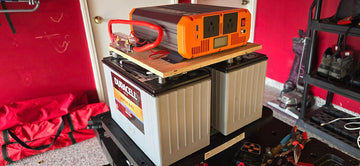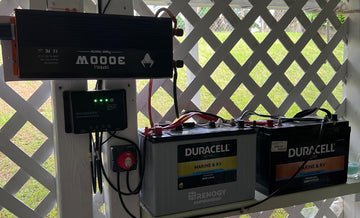With the continuous development of renewable energy technologies around the world, solar power is becoming more and more popular as a clean and efficient form of energy. In these systems, the selection of energy storage devices is critical to overall performance and safety. Lithium iron phosphate batteries (LiFePO4) are widely used in solar power systems due to their excellent safety and performance. In this paper, we will delve into the safety of LiFePO4 batteries and their advantages and potential risks in solar applications.
Table of contents:
- What is LiFePO4 battery?
- LiFePO4 battery safety features
- LiFePO4 battery compared to other lithium battery safety comparison
- Safety of LiFePO4 batteries in solar power systems
- Potential Risks of Lithium Iron Phosphate Batteries
- Measures to improve the safety of LiFePO4 batteries
- Recommended LiFePO4 batteries for high safety
- FAQs
What is LiFePO4 battery?
LiFePO4 battery, the full name is lithium iron phosphate lithium-ion battery, is a lithium-ion battery that uses lithium iron phosphate (LiFePO4) as the positive electrode material and carbon (graphite) as the negative electrode material. This type of battery is a secondary battery, i.e., a type of battery that can be repeatedly charged and discharged.
LiFePO4 batteries work similarly to other lithium-ion batteries in that they store and release energy through the movement of lithium ions between the positive and negative electrodes. During charging, lithium ions are removed from the positive electrode material, migrate to the negative electrode through the electrolyte, and are embedded in the negative electrode material; during discharging, the opposite occurs, with lithium ions being removed from the negative electrode, migrating to the positive electrode through the electrolyte, and embedding in the positive electrode material. During this process, the electrons move through the external circuit, forming a current that provides electrical energy for external devices.
LiFePO4 batteries have a variety of advantages, including:
- High safety: lithium iron phosphate material itself has high thermal and chemical stability, and is not likely to cause combustion or explosion even under extreme conditions such as high temperature or overcharging.
- Long cycle life: the cycle life of LiFePO4 battery is usually up to 2000 times or more, much higher than some other types of lithium-ion batteries.
- Environmental protection: LiFePO4 battery does not contain heavy metals and other harmful substances, environmentally friendly.
- Low self-discharge rate: LiFePO4 battery has a low self-discharge rate during storage, and can maintain power for a long time.
- Wide operating temperature range: LiFePO4 battery can work in a wide temperature range, adaptable.
However, LiFePO4 batteries also have some limitations, such as relatively low energy density, resulting in the same weight or volume, its storage of electrical energy may not be as much as some other types of lithium-ion batteries. In addition, the charging speed of the LiFePO4 battery may also be somewhat limited.
Nonetheless, LiFePO4 batteries have been widely used in electric vehicles, energy storage systems, solar power generation systems, and other fields due to their advantages of high safety, long life, and environmental friendliness. With the continuous progress of technology and cost reduction, the application prospect of LiFePO4 battery will be more broad.
LiFePO4 battery safety features
LiFePO4 battery is famous for its excellent safety, which is mainly reflected in the following aspects:
1. High thermal stability
The cathode material of LiFePO4 battery, LiFePO4 battery, has high chemical stability, and the P-O bond in its crystal is solid and difficult to decompose. Therefore, in a high temperature environment, LiFePO4 battery can maintain high stability, not easy to occur thermal runaway phenomenon. This makes LiFePO4 battery has a significant advantage in safety, especially for temperature-sensitive or high-temperature applications.
2. Not easy to burn and explode
Compared with other types of lithium-ion batteries, LiFePO4 battery is not easy to cause combustion or explosion under extreme conditions such as overcharge and short circuit. This is because lithium iron phosphate olivine structure of oxygen is difficult to precipitate, reducing the thermal stability of the battery and the risk of explosion. At the same time, the electrolyte of LiFePO4 battery adopts organic solvent, which is not easy to leak, further improving its safety.
3. No heavy metal pollution
LiFePO4 battery does not contain heavy metals and other harmful substances, environmentally friendly. In the process of production and use, LiFePO4 battery will not produce harmful emissions, in line with environmental requirements. This makes LiFePO4 battery widely used in energy storage and electric vehicles and other fields, but also helps to promote the development of green energy.
4. Battery management system optimization
LiFePO4 batteries are usually equipped with an advanced battery management system (BMS), which can monitor the status and performance of the battery in real time to ensure that the battery operates within the safety range. The battery management system can precisely control the charging and discharging process of the battery to prevent overcharging, over-discharging and other abnormalities from occurring, thus improving the safety and service life of the battery.
LiFePO4 battery compared to other lithium battery safety comparison
Comparison with ternary lithium batteries:
- Safety: LiFePO4 battery is safer than Li-ion battery. Lithium ternary batteries are easy to decompose at high temperatures to produce oxygen, which may cause combustion or explosion. LiFePO4 battery is not easy to thermal runaway and combustion phenomenon.
- Cycle life: The cycle life of LiFePO4 battery is relatively long, usually can reach more than 2000 times, while the cycle life of LiFePO4 battery may be shorter.
- Cost: Due to the differences in raw materials and production processes, the cost of LiFePO4 battery may be higher than Li-ion battery, but the advantages in safety make it more valuable in practical applications.
Compare with Li-Mn2O4 battery:
- Safety: LiFePO4 battery is also safer than Li-Mn2O4 battery. Li-Mn2O4 batteries may also experience thermal runaway under high temperature or overcharging conditions.
- Cycle life: The cycle life of LiFePO4 battery is also better than that of LiMn2O4 battery.
- Energy density: The energy density of LiFePO4 battery may be higher than that of LiFePO4 battery, but safety considerations make LiFePO4 battery more advantageous in some application scenarios.
Compare with LiCoO2 battery:
- Safety: Lithium cobalt acid battery is relatively low in safety, especially in high temperature and overcharge conditions. LiFePO4 battery has higher safety.
- Energy density: Lithium cobalt acid batteries have higher energy density, but this also increases the risk of thermal runaway and combustion.
- Cost: The cost of Li-CoO2 battery may be higher, partly because its raw material contains rare metal cobalt.
In summary, LiFePO4 batteries have significant safety advantages over other lithium batteries. Its high thermal stability, structural stability, not easy to burn and explode, and environmental protection characteristics make LiFePO4 battery more valuable in practical applications. Although LiFePO4 batteries may not be as good as other lithium batteries in some aspects (such as energy density and cost), the safety considerations make it the preferred battery type in many fields.
Safety of LiFePO4 batteries in solar power systems
The safety of LiFePO4 batteries in solar power generation systems is outstanding, and its main advantages include excellent thermal stability and low risk of thermal runaway. Due to the stability of its chemical structure, the battery is less likely to decompose at high temperatures and under overcharging conditions, thus effectively reducing the potential risk of fire and explosion. In addition, LiFePO4 batteries are usually designed to include a variety of protection mechanisms, such as overcharge and short-circuit protection, to ensure safety in a variety of use conditions.
Stability in long-term use and low self-discharge rates also make LiFePO4 batteries more suitable for solar applications, capable of storing energy for long periods of time while remaining safe. In addition, the battery is free of harmful heavy metals and meets environmental requirements, further enhancing its appeal as a sustainable energy solution. Therefore, LiFePO4 batteries in solar energy systems not only provide an efficient way to store energy, but also ensure overall safety and environmental friendliness.
Potential Risks of Lithium Iron Phosphate Batteries
Although LiFePO4 batteries are widely recognized as a safe and reliable battery type, there are still some potential risks. The following is a detailed analysis of the potential risks of LiFePO4 batteries:
Thermal runaway risk
LiFePO4 battery may trigger thermal runaway phenomenon under certain circumstances, such as suffering major damage, operating at high temperature for a long time, or experiencing problems such as short circuit. Thermal runaway is the rapid accumulation of heat inside the battery, resulting in a sharp rise in battery temperature, which may lead to combustion or explosion. This risk, although relatively low, may still occur under extreme conditions.
Safety Hazards during Manufacturing and Cycling
During the process of battery manufacturing and cycling, LiFePO4 batteries may produce monolithic iron. The accumulation of these iron particles can easily puncture the battery diaphragm, increasing the risk of internal short circuit. In addition, the cathode material of LiFePO4 batteries has poor conductivity, high internal resistance and low overcharge acceptance, and these characteristics may also affect the safety performance of the battery to a certain extent.
Decrease in low-temperature performance
The performance of LiFePO4 battery in low temperature environment will be significantly reduced. Low temperature will lead to a decrease in the activity of the active material inside the battery, making the number of lithium ions that can move to bring discharge current decrease, which leads to a decrease in capacity, poor multiplier performance and other problems. At extreme low temperatures, the battery may not even be able to operate or charge properly. Although this decline in performance does not directly cause a safety accident, it will affect the effectiveness and life of the battery.
Battery pack life difference
Although the cycle life of LiFePO4 battery single cell is relatively long, but made into a battery pack, due to the different technical strengths of manufacturers, the life of the battery pack there will be a big difference. Battery pack life is significantly lower than the monomer, which to a certain extent increases the potential risk of battery packs in the process of use.
Measures to improve the safety of LiFePO4 batteries
Measures to improve the safety of LiFePO4 batteries include the following aspects:
1. Adoption of Battery Management System (BMS)
Battery Management System (BMS) can monitor the charging and discharging status, temperature, voltage and other parameters of the battery in real time to ensure that the battery works within the safety range.BMS can effectively prevent overcharging, over-discharging and short-circuiting etc., and issue an alarm and cut off the power supply in time, thus reducing the risk.
2. Mechanical protection measures
Providing physical protection for the battery against mechanical damage is the key to ensuring safety. The impact of external shocks can be minimized by reinforcing the battery case material, designing cushioning devices and adopting appropriate installation methods. In addition, it is critical to ensure that the battery is installed away from vulnerable components and sources of danger.
3. Maintain appropriate working temperature
LiFePO4 battery performance in high and low temperature environment will be affected, so in the design and use of measures should be taken to maintain the battery in the appropriate operating temperature range. For example, heating or cooling systems can be used, especially in extreme weather conditions, to ensure the stability and safety of the battery.
4. Avoid over-charging and over-discharging
During battery charging and discharging, the voltage and current need to be strictly controlled to avoid overcharging or overdischarging the battery. Using a proper charger and checking the battery status regularly can effectively reduce this risk. In addition, regular battery maintenance and inspection are also necessary.
5. Regular maintenance and inspection
Regular maintenance and inspection of LiFePO4 batteries to detect potential problems and deal with them in time can effectively prevent safety hazards caused by failures. This includes measures such as regular checking of battery connections, cleaning of contacts, and monitoring of battery health status.
6. Use certified products
Selecting high-quality battery products that have been certified and tested can greatly improve the safety of the system. Ensuring that the battery complies with relevant safety standards and specifications can reduce the risk of accidents during use.
By implementing the above measures, the safety of LiFePO4 batteries can be significantly improved, thus ensuring their reliable operation in various application scenarios.
Recommended LiFePO4 batteries for high safety
If you are looking for LiFePO4 batteries for residential solar systems or off-grid living, then the following batteries will be ideal for you. They all offer high safety and deep cycle batteries to meet the needs of a variety of application scenarios.
12V 100AH LiFePO4 Lithium Battery

Product Features:
- Ultra-long life: LiFePO4 batteries last 8 to 10 times longer than ordinary lead-acid batteries (up to 2,000 to 5,000 cycles), which typically have only 300 to 500 cycles. The usable capacity is twice that of lead-acid batteries and the weight is reduced by 30%, thanks to the higher energy density. It has no memory effect and holds its charge better.
- Built-in Battery Management System (BMS): The built-in BMS prevents overcharging, over-discharging, over-current and short-circuiting, and has an excellent self-discharge rate. The high-temperature cutoff function prevents charging above 122°F (50°C). This makes lithium batteries safer than lead-acid batteries and ideal for indoor and outdoor use.
- Capacity Expansion: lithium batteries can be connected in parallel and series, up to four identical batteries in series, generating up to 48V. up to four identical batteries in parallel, up to 400Ah. supports simultaneous use in parallel and series, up to 48V 400Ah. can only be used with batteries of the same voltage and capacity that are purchased within a six-month period.
- Low Temperature Cutoff Function: The built-in BMS has a low temperature cutoff function to avoid irreversible damage to the battery when charging at low temperatures (32°F/0°C). Peak current up to 300-350A for 3~5 seconds, suitable for most marine applications.
- Widely used: for home energy storage systems, uninterruptible power supply (UPS), lighting, digital/surveillance cameras, portable TVs, electric cars, DIY stereos, 12V routers, air pumps, fishfinders, RV's, travel trailers and more.
12V 200Ah Lithium LiFePO4 Deep Cycle Battery

Product Features:
- Excellent Performance: 12.8V 200Ah LiFePO4 battery is powered by 8 A-grade brand new LiFePO4 cells with a built-in 100A BMS system with over-charging, over-discharging, over-current and short-circuit protection. This Li-FePO4 battery has the advantages of high energy density, long cycle life, good safety performance, and no memory effect, etc. It also has an extremely low self-discharge rate, ensuring that it can maintain maintenance-free storage for up to one year.
- Long life and light weight: 12V 200Ah lithium-ion batteries have a cycle count of over 4,000 cycles, while traditional lead-acid batteries can only cycle 200-500 times. These batteries are acid-free, making them safer and more environmentally friendly than lead-acid batteries, and they weigh only 48.6 pounds, about one-third the weight of lead-acid batteries.
- Widely Used: This battery can be widely used in many fields, such as: emergency lighting, RV/outdoor camping, marine applications, home energy storage, computer power backup, off-grid applications, solar and wind energy storage, etc.
- Expansion & Charging: 12V 200Ah Li-ion battery can provide continuous 100A current, maximum current up to 300A (for 5 seconds). Up to 4 identical batteries can be connected in series or parallel and support 50A fast charging.
FAQs
Will LiFePO4 batteries explode?
LiFePO4 batteries have a high level of safety and a relatively low risk of explosion. These batteries maintain good stability even under extreme conditions such as high temperatures or overcharging.
How long is the service life of LiFePO4 battery?
The lifespan of LiFePO4 batteries is affected by a number of factors, including the environment in which they are used and the number of times they are charged and discharged. Generally speaking, the cycle life of these batteries can be more than 2,000 times, showing a high degree of durability.
What are the advantages of LiFePO4 batteries in solar power systems?
LiFePO4 batteries have multiple advantages in solar power systems, including long life, high safety, environmental friendliness and high energy density. These characteristics make them an ideal choice for solar power systems.
Will LiFePO4 batteries be affected by the memory effect?
LiFePO4 batteries are not susceptible to the memory effect, so they can be recharged at any charge level without being fully discharged. This makes it easier to use and maintain.
Does LiFePO4 battery generate heat?
LiFePO4 batteries do generate some heat during normal operation and charging/discharging, but due to their thermal stability, they usually do not reach dangerous temperatures.













